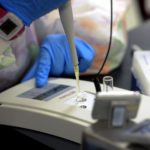UWF begins research on potential “invisible” victims of oil spill
A University of West Florida Environmental Studies assistant professor has started another oil spill research project in the wake of the explosion April 20 off the coast of Louisiana in the Gulf of Mexico.
Matthew Schwartz said he and a graduate student will be sampling for dissolved organic carbon and dissolved organic nitrogen – a range of different components naturally found in sea water that will change as oil and oil components arrive in the Pensacola area. The project will focus on how changing levels could damage delicate ecosystems such as sea grass beds.
“The oil-washed birds and oil-covered marshland are a very obvious impact of the oil spill and it’s horrible,” he said. “What I’m wondering is might there be invisible victims of the ecosystems as well. We will be looking at a combination of dissolved nutrients, dissolved oxygen and dissolved organic nitrogen, we are looking at all the stuff that you cannot see.”
The project, which will dovetail with sand and water sampling by the Center for Environmental Diagnostics and Bioremediation at UWF, will first establish current levels of dissolved organic carbon and dissolved organic nitrogen and then monitor the levels on a regular basis. Dissolved organic carbon levels are essential components of the microbial and phytoplankton activity to break down the oil in the water. Samples will be taken from several areas including the Gulf Islands National Seashore, where he is already conducting research on water quality.
Because of his previous research on oxygen-minimum zones in the Arabian Sea, Schwartz is familiar with the current situation in the Gulf. In addition to the presence of the toxic crude oil in an ecosystem, the bacteria breaking down the oil steal much of the available oxygen from the creatures living there. “Just the oil plume itself is inhospitable, but lower dissolved oxygen levels make it harder for some of the critters who need oxygen to breath to survive.”
As the oil moves through and dissolves in the Gulf water, it is distributing oil components to a wider and wider area. “Even if we don’t get a full-on hit of oil slicks, we will be getting the dissolved oil compound,” he said.
The impact on inland ecosystems could be significant with some microbial and phytoplankton life systems kicking into overdrive before quickly drawing down only to kick up again. Extensive research exists into dissolved organic carbon cycling and how it relates to different ecosystems, but what isn’t known is how an oil spill might influence the equation.
“An oil spill could have a huge impact on those dissolved organic carbon concentrations, such as something that is normally 300 might be 3,000 or even 30,000,” he said. How those levels are felt in delicate ecosystem is the target of his research.
“None of us may fully realize the scientific impact or the economic impact of this . . . that’s why I am doing the research I’m doing. What I’m trying to look is something that isn’t obvious, but may actually have a large long-scale impact,” he said.
For more information, contact Schwartz at (850) 474-3469 or e-mail mschwartz@uwf.edu. Follow the UWF oil spill response at uwf.edu/UWFMain/press/oilspill or on Twitter by searching #uwfoilresponse.
By Susie Forrester, University Marketing Communications


